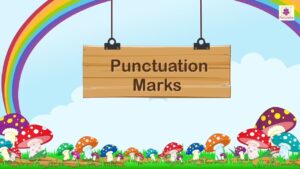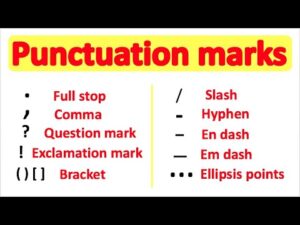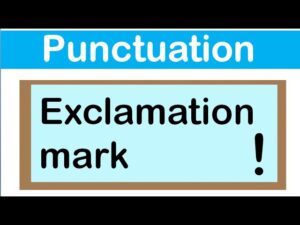Back to: English Language Primary 6
Welcome to today’s class!!
We are excited to have you join our class!!
In today’s English class, we will be learning about Punctuation Marks
Punctuation Marks

In the English language, it is said that you can’t write without punctuation. Well, you can, but your writing wouldn’t make any sense to your reader.
Punctuation is as important to your writing as your word choice, and structure. When any one of these elements is missing, you don’t have an acceptable piece of writing—you have an unacceptable word.
Let’s take a look at some common punctuation marks

Periods
When it comes to punctuation marks, you don’t get any more basic than periods. The period, also known as the full stop, looks like this: .
It has one job: to end a declarative sentence.
That’s all. That’s what periods do.
Ellipses
Ellipses look like a set of three periods together: . . .
An ellipsis is used to show that information has been omitted from a quote, usually to shorten it.
Commas
Commas are one of the most common punctuation marks. A comma looks like this: ,
They’re also among the most commonly misused punctuation marks.
A comma indicates a pause in a sentence, either between phrases, clauses, or items in a list. This is what can make them tricky—the points where you’d pause in a spoken sentence aren’t always where you’d use a comma in a written sentence.
Apostrophes
The apostrophe is a busy little punctuation mark. It looks like this: ’
Apostrophes’ jobs include:
- Creating possessive nouns (Bayo’s house, the Williams’ car)
- Combining words into contractions (don’t, she’ll, weren’t)
And more casually, apostrophes are used to shorten words (government becomes gov’t and the 1970s becomes the ’70s) and in quotes to show the speaker has shortened a word, for example: We looked and found nothin’.
Exclamation mark

Punctuation is exciting!
You read that sentence in an eager, high-energy voice because it ended with an exclamation point: !
Much like the period, the exclamation point has one job: to make sentences exciting!
Just be careful not to overuse them—and in some kinds of writing, it’s best to leave them out entirely.
Question Marks
The question mark is another one-job punctuation mark. They look like ? and they’re used to communicate that a sentence is a question.
Only use a question mark when you’re asking a direct question, like:
- What kind of phone do you have?
- Why didn’t my package arrive?
Indirect questions are actually declarative sentences, so they end with periods. Examples of indirect questions include:
- I wondered why there was so much traffic.
- She asked herself how she could have missed the signs.
Dashes
There are two different kinds of dash you probably use fairly regularly in your writing—and one you don’t. The two common ones are:
Em dash —
En dash –
And the rare one is known as a double hyphen. It looks like this: ⸗ and you only use it when you’re wrapping a hyphenated word onto the next line of text.
Quotation Marks
As their name implies, quotation marks means direct quotes. But that’s not all they do.
They look like “ ” and they can also be used to:
- Signify a word within a sentence (Please refer to the champion as “winner.”)
- Communicate that a specific word is being used in a disapproving way (The day-old pizza was “not that terrible.”)
Hyphens
Hyphens might look like dashes, but they aren’t dashes. Hyphens are used to create compound words like:
- Load-bearing
- Well-loved
- Great-looking
In summary, Punctuation is as important to your writing as your word choice, and structure. When any one of these elements is missing, you don’t have an acceptable piece of writing—you have an unacceptable word.
Evaluation
How many punctuation marks did you learn in today’s class? List at least 5 of them.
Reading Assignment
Give two examples each of the following punctuation marks:
- Periods
- Comma
- Question marks
Weekend Assignment
Write the right Punctuation Marks in the following sentences:
- This is wrong
- What is wrong with her
- The man said, she is not going anywhere
- Great
- Get up
- The boy in the school
We hope you enjoyed today’s class. In our next class, we will be learning about Writing: How I Will Spend My Coming Holidays.
Let us know your thoughts and questions in the comment section, and we will attend to them as fast as we can.
